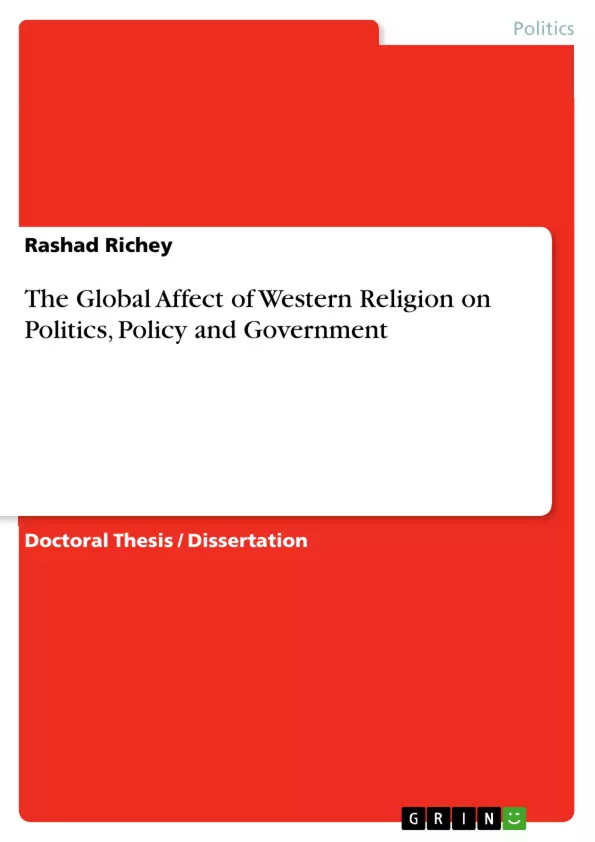The present paper investigates the effect of Western religion on governance, policies, and politics, within both the domestic and the global contexts. This question, however, leads into the need for deep ideological analysis. The paper thus defines the concept of Western religion, and then proceeds to show how Western religion is inseparable from Western civilization, including modern values which are often called secular but which, in fact, have ideological roots that can be traced to Western religion.
Over the course of this analysis, an opposition emerges between Western religion on the one hand and secular progressivism on the other—the latter of which is both derived from and antagonistic toward Western religion. The contours of this ideological conflict and their implications are explored through the development of a comprehensive theoretical framework.
The independent research of the present paper consists of an interview with a selected congressman. The interview seeks to delve into the congressman's views regarding Western religion and its effects on governance, policies, and politics. This data is analyzed using a qualitative method.
Finally, the present paper analyzes and discusses the statements of the congressman in the interview in light of the previously developed theoretical framework. The main conclusion that is reached is that although the congressman is insightful in several respects, he seems to lack a general awareness of the nature of ideology, or the fact that secular progressivism is in ideological conflict with Western religion, even as the former cannot escape the influence of the latter. A key recommendation that emerges from this conclusion is that it is perhaps necessary for both politicians in particular and Americans in general to develop a deeper understanding of the nature of ideology, especially as this pertains to politics.
Inhaltsverzeichnis (Table of Contents)
- Executive Summary
- Introduction/Background
- The Descriptive Angle
- The Aspirational Angle
- The Foreign Perspective
- The Domestic Perspective
- A Further Conceptual Clarification
- The Map for the Present Paper
- Theoretical Review and Analysis
- The Marxist Perspective
- The Rebuttal from Castoriadis
- Case Study: Gay Marriage
- Case Study: ISIS
- Liberty and the Evangelical Mentality
- Description versus Aspiration, Revisited
- Methodology and Results
- The Interview
- Synopsis and Analysis
- Findings and Discussion
- Pushing Ideology
- Capitalism as Religion
- The Current Moment
- A "Progressive" Nation
- The Decline of Western Religion?
Zielsetzung und Themenschwerpunkte (Objectives and Key Themes)
This dissertation explores the complex relationship between Western religion and its influence on politics, policies, and government within both domestic and global contexts. It delves into the ideological roots of Western civilization, analyzing how Western religious values have shaped modern secular values. The paper examines the tension between Western religion and secular progressivism, exploring the implications of this ideological conflict.
- The impact of Western religion on governance, policies, and politics
- The connection between Western religious values and modern secular values
- The ideological conflict between Western religion and secular progressivism
- The role of ideology in shaping political discourse and decision-making
- The implications of Western religious influence on both domestic and foreign policy
Zusammenfassung der Kapitel (Chapter Summaries)
- Introduction/Background: This chapter sets the stage by exploring the ongoing debate about whether the United States is a religious or secular nation. It argues that while the separation of church and state is a cornerstone of American governance, the nation's founding principles and values are deeply rooted in the Judeo-Christian tradition.
- Theoretical Review and Analysis: This chapter examines the theoretical framework used to analyze the relationship between Western religion and politics. It draws upon the Marxist perspective and the rebuttal offered by Castoriadis, exploring case studies of gay marriage and ISIS to illustrate the interplay between religion and political ideologies.
- Methodology and Results: This chapter outlines the methodology employed in the dissertation, focusing on an interview with a selected congressman. The chapter explains how the interview data was analyzed using qualitative methods to explore the congressman's views on Western religion and its effects on governance.
Schlüsselwörter (Keywords)
The primary focus of this dissertation centers around the influence of Western religion, specifically the Judeo-Christian tradition, on politics, policies, and government. Key concepts explored include Western civilization, secular values, ideological conflict, secular progressivism, and the role of ideology in shaping political discourse and decision-making.
- Quote paper
- Dr. Rashad Richey (Author), 2016, The Global Affect of Western Religion on Politics, Policy and Government, Munich, GRIN Verlag, https://www.grin.com/document/372219



